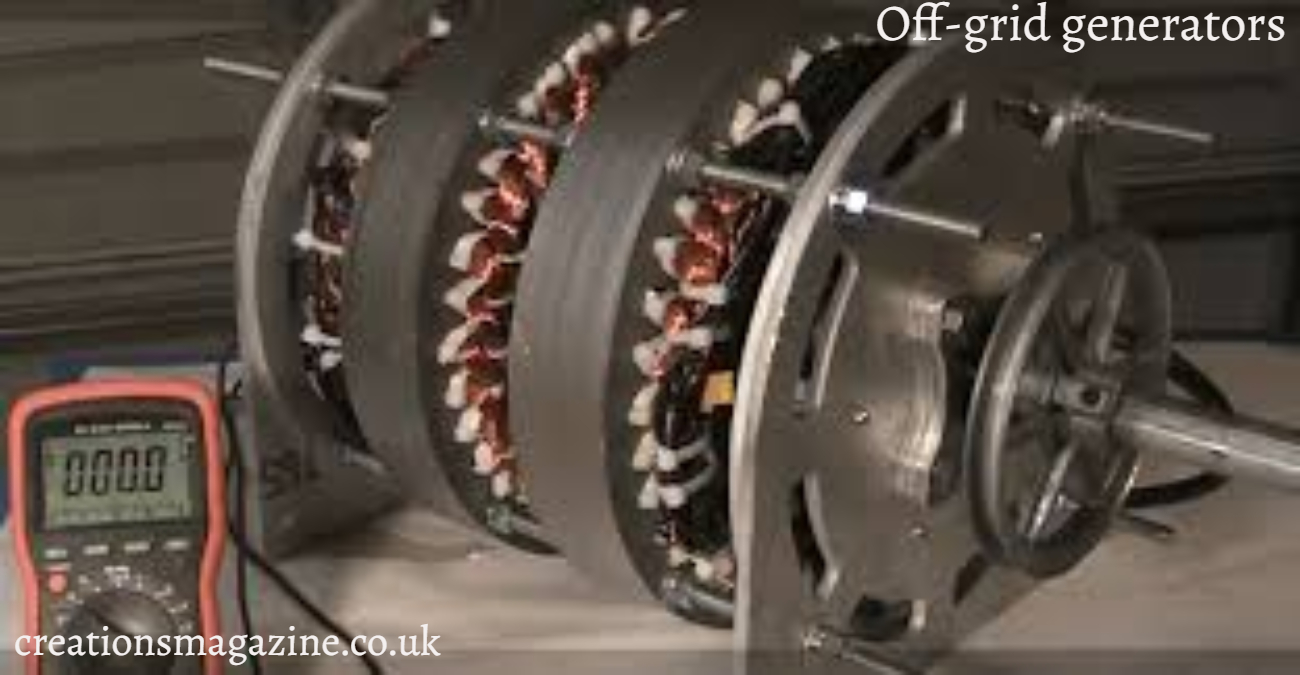Are you tired of being shackled to high electricity bills and the unpredictable nature of utility companies? It might be time to break free and explore the world of off-grid generators. In this blog post, we will delve into the comparison between off-grid generators and traditional power sources to help you determine which option is better suited for your needs. Let’s embark on a journey towards energy independence and sustainability together!
The Benefits of Using Off-Grid Generators
Off-grid generators offer a multitude of benefits that make them an attractive option for those seeking independence from traditional power sources. One major advantage is the cost savings they provide. By generating your own electricity, you can significantly reduce or even eliminate monthly utility bills, saving money in the long run.
Another significant benefit of off-grid generators is the independence they offer from utility companies. With your own power source, you are not reliant on external providers and their potential service disruptions or rate increases. This autonomy gives you peace of mind knowing that you have control over your energy supply.
Furthermore, choosing an off-grid generator is also an environmentally friendly option. By utilizing renewable energy sources such as solar or wind power, you can reduce your carbon footprint and contribute to a greener planet. Embracing sustainable practices through off-grid generators aligns with eco-conscious lifestyles and supports environmental conservation efforts.
You May Like Also : Electricians Around Me: The Benefits of Hiring a Professional
A. Cost Savings
When it comes to off-grid generators, one of the most significant advantages is the cost savings they offer. Unlike traditional power sources that come with monthly utility bills and fluctuating rates, off-grid generators provide a more stable and predictable cost structure.
By generating your own power through renewable sources like solar panels or wind turbines, you can significantly reduce or even eliminate your reliance on expensive electricity from the grid. This translates into long-term savings for homeowners and businesses alike.
Investing in an off-grid generator may require an initial upfront cost, but the return on investment over time is undeniable. With proper maintenance and efficient usage, these systems can pay for themselves in savings on utility bills.
In addition to saving money in the long run, using an off-grid generator also allows you to take control of your energy consumption and reduce wastage. This level of autonomy not only benefits your wallet but also contributes to a more sustainable future for our planet.
B. Independence from Utility Companies
When opting for an off-grid generator, one of the significant benefits is the independence it offers from utility companies. No longer being reliant on external power sources means you have control over your energy production and consumption. This independence provides a sense of security in knowing that you can generate your electricity regardless of grid outages or disruptions.
Being free from utility companies also means avoiding potential price hikes or fluctuations in electricity rates. You are no longer at the mercy of these companies when it comes to determining how much you pay for power each month. Instead, with an off-grid generator, you have more stability and predictability in managing your energy costs.
Furthermore, by embracing this independence, you can reduce your carbon footprint and contribute to a more sustainable environment. Off-grid generators often utilize renewable energy sources like solar or wind power, which are clean and eco-friendly alternatives to traditional fossil fuels. Embracing this autonomy not only benefits you but also helps protect our planet for future generations.
C. Environmentally Friendly Option
Off-grid generators are not only beneficial for cost savings and independence but also offer an environmentally friendly option. By generating power from renewable sources like solar or wind, off-grid systems help reduce carbon emissions and minimize the reliance on fossil fuels.
Traditional power sources, on the other hand, often contribute to pollution and environmental degradation due to their heavy dependence on non-renewable resources such as coal or natural gas. This can have detrimental effects on air quality and global warming.
Choosing an off-grid generator means making a conscious decision to prioritize sustainability and reduce your carbon footprint. With advancements in technology, off-grid systems have become more efficient and reliable than ever before, making them a viable alternative for those looking to embrace eco-friendly energy solutions.
The Downsides of Traditional Power Sources
Traditional power sources have their drawbacks that are worth considering. One major downside is the high cost of electricity bills that homeowners and businesses face month after month. The reliance on traditional power grids means being at the mercy of fluctuating energy prices, leading to unpredictable expenses.
Another disadvantage is the dependence on fossil fuels for generating electricity, which contributes to environmental pollution and climate change. Burning fossil fuels releases harmful greenhouse gases into the atmosphere, impacting air quality and accelerating global warming.
Furthermore, traditional power sources are vulnerable to disruptions such as natural disasters or grid failures, leaving individuals without access to essential electricity for extended periods. This lack of reliability can be a significant inconvenience and even pose risks in emergency situations.
In addition, maintaining aging infrastructure for traditional power grids requires ongoing investments in repairs and upgrades, passing additional costs onto consumers. As technology advances, these outdated systems may struggle to keep up with increasing energy demands efficiently.
A. High Cost of Electricity Bills
Are you tired of constantly feeling the pinch when your electricity bill arrives each month? The high cost of electricity bills from traditional power sources can be a significant burden on your finances. It seems like the rates keep increasing, adding to your expenses.
This financial strain can make it challenging to budget for other necessities or luxuries in life. You might find yourself having to cut back on things you enjoy just to cover those hefty utility bills. And let’s not forget about the additional fees and charges that often accompany traditional power sources.
It’s frustrating how much money goes towards simply keeping the lights on and appliances running. Imagine being able to redirect those funds towards something more meaningful or enjoyable instead of pouring it into expensive electricity bills every month.
B. Dependence on Fossil Fuels
Traditional power sources rely heavily on fossil fuels to generate electricity. The extraction and burning of these fuels release harmful emissions into the atmosphere, contributing to air pollution and climate change.
Fossil fuels are finite resources that require extensive mining and drilling operations, causing environmental destruction and habitat loss. Additionally, fluctuations in fuel prices can lead to unpredictable energy costs for consumers.
The dependence on fossil fuels also poses national security risks as countries compete for access to limited reserves. Transitioning towards cleaner energy sources like off-grid generators can reduce our reliance on these unsustainable practices while promoting a more sustainable future for generations to come.
Factors to Consider When Choosing Between Off-Grid Generators and Traditional Power Sources
When deciding between off-grid generators and traditional power sources, there are several key factors to consider. Assess your energy needs – how much power do you require on a daily basis? Understanding your consumption patterns will help determine which option is more suitable for you.
Think about the reliability of each system. Off-grid generators can provide independence from utility companies but may require regular maintenance. On the other hand, traditional power sources offer consistent electricity supply but come with monthly bills that can fluctuate.
Consider the environmental impact as well. Off-grid generators are a cleaner alternative as they rely on renewable energy sources like solar or wind power. In contrast, traditional power sources often rely on fossil fuels, contributing to air pollution and climate change.
Factor in the initial investment costs and long-term savings associated with each option. Off-grid systems may have higher upfront costs but can lead to significant savings over time by reducing or eliminating monthly utility bills. Traditional power sources might seem cheaper initially but could end up costing more in the long run due to rising electricity prices.
Conclusion
Choosing between off-grid generators and traditional power sources ultimately comes down to your unique needs and priorities. Off-grid generators offer cost savings, independence from utility companies, and environmental friendliness. On the other hand, traditional power sources can result in high electricity bills and dependence on fossil fuels.
When making your decision, consider factors such as upfront costs, long-term savings, reliability of power supply, environmental impact, and level of self-sufficiency you desire.
In the end, whether you opt for an off-grid generator or stick with a traditional power source depends on what aligns best with your lifestyle and values. Whichever path you choose, both options have their pros and cons – it’s all about finding the right balance for your energy needs.











